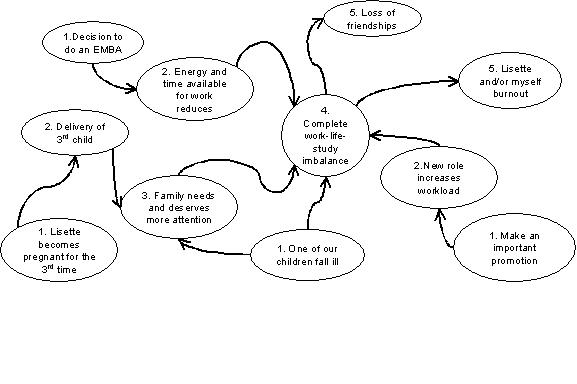Difference between revisions of "Verheij, Frans - Learning Log"
| Line 5: | Line 5: | ||
15 December 2005<br> | 15 December 2005<br> | ||
====Personal Reflection==== | |||
Over the past 4 months I followed Daniel Erasmus scenario planning class. In this period I have asked myself the question “is the practice of scenario planning valuable? Could there be any benefit in developing specific scenarios for my company or myself?” The answer to the question is definitely yes; if you are able to create a credible view of the future, somehow develop scenarios with differences in likelihood, you will be able to amend your strategy to the most likely scenarios of the future. The Shell example where management, as only oil company, seriously started to consider the fact that the oil market would not be driven by demand but by supply has moved Shell in the seventies up from 5th place to biggest oil producing company in the world. In my specific industry, if we would somehow be able to get a better understanding of the most important life threatening deceases (and they will not be aids or cancer) in 20 years we could start developing cures today. Even in our group’s scenarios on the future of the biotech industry for medical applications in 2015 in which the group could not get consensus (to put it nicely) between the most likely scenarios, I found the scenario process very helpful in understanding the industry better and the forces that will affect the future of the industry. Also, while moving towards 2015 I will understand how specific events are indicators that will lead to specific scenarios coming true. (E.g. if more negative incidents happen with Biotech drugs like recalls, dying patients or unsuccessful cloning this will heat up the ethical debate enormously which will affect governments willingness to support the industry, etc, etc). We agreed with our scenario group to come together in 2015, most likely on a tropical island, and see which of our three scenarios has become reality.<br> | |||
I would also like to reflect on my work-life-study (im)-balance during the MBA, considering that this is the last assignment due before I will be able to re-introduce myself to my wife and three young children (in about 90 minutes we will open a big bottle of champagne). If I would have written three scenarios one would be as explained in the causal diagram below (or bubble diagram as my fellow students called them). | |||
<br> | <br> | ||
[[Image:Work_Life_Study_Imbalance_V02.jpg]] | [[Image:Work_Life_Study_Imbalance_V02.jpg]] | ||
Revision as of 20:22, 15 December 2005
Personal, Academic and Professional Reflection Frans Verheij on scenario planning class
Frans Verheij
RSM, EMBA 2005
15 December 2005
Personal Reflection
Over the past 4 months I followed Daniel Erasmus scenario planning class. In this period I have asked myself the question “is the practice of scenario planning valuable? Could there be any benefit in developing specific scenarios for my company or myself?” The answer to the question is definitely yes; if you are able to create a credible view of the future, somehow develop scenarios with differences in likelihood, you will be able to amend your strategy to the most likely scenarios of the future. The Shell example where management, as only oil company, seriously started to consider the fact that the oil market would not be driven by demand but by supply has moved Shell in the seventies up from 5th place to biggest oil producing company in the world. In my specific industry, if we would somehow be able to get a better understanding of the most important life threatening deceases (and they will not be aids or cancer) in 20 years we could start developing cures today. Even in our group’s scenarios on the future of the biotech industry for medical applications in 2015 in which the group could not get consensus (to put it nicely) between the most likely scenarios, I found the scenario process very helpful in understanding the industry better and the forces that will affect the future of the industry. Also, while moving towards 2015 I will understand how specific events are indicators that will lead to specific scenarios coming true. (E.g. if more negative incidents happen with Biotech drugs like recalls, dying patients or unsuccessful cloning this will heat up the ethical debate enormously which will affect governments willingness to support the industry, etc, etc). We agreed with our scenario group to come together in 2015, most likely on a tropical island, and see which of our three scenarios has become reality.
I would also like to reflect on my work-life-study (im)-balance during the MBA, considering that this is the last assignment due before I will be able to re-introduce myself to my wife and three young children (in about 90 minutes we will open a big bottle of champagne). If I would have written three scenarios one would be as explained in the causal diagram below (or bubble diagram as my fellow students called them).

